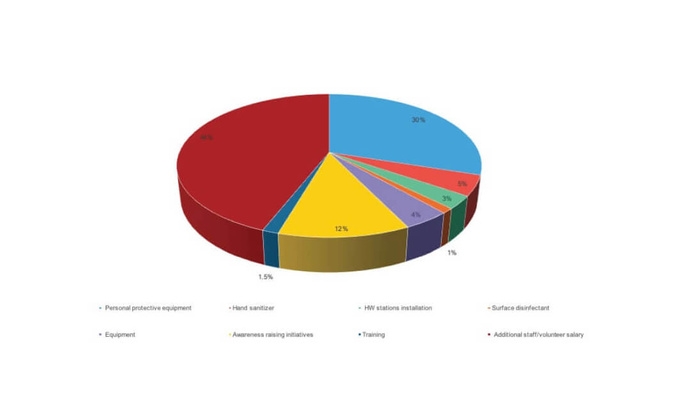

COVID-19 pandemic has challenged the health systems in Bangladesh with inadequate structural and human resources. MOHFW will require additional resources for combatting existing situation and also post pandemic, for health systems to go back to its pre-pandemic status where it can give services to other illnesses- creating in effect a double burden on the health sector. This year, given the COVID-19 related emergency, Bangladesh Health Watch (BHW) carried out the rapid review to assess the budgetary allocation in the health sector (including water and sanitation) on COVID-19 response by the government, private (for profit and not-for profit) organizations and development partners in terms of equity, transparency/corruption, efficiency and effectiveness. Data had been collected over the period of 16th April to 5th May, 2020 from three different sources: desk review, key informant interviews and collection of allocation statements from non-governmental organisations.
Key findings
During the current health and as well as economic crisis, the total stimulus package declared is 3.6% of Gross Domestic Product. It is not adequate with respect to the need, and particularly not at all sufficient for the health sector. During this COVID-19 crisis, the health sector still remained neglected as a national priority. The total stimulus package for health (BDT 850 crore) represents 0.08% of the total stimulus package announced.
MOHFW and many development partners have tried to mobilize unused fund from some other works and also from the contingency fund to help tackling the pandemic. However, Bangladesh was late reactive in terms of taking action, and in many cases Bangladesh acted like ‘firefighting’ and ‘ad-hoc basis’. This led to delay in resources use. Though the World Bank (WB) allocated USD 100 million within two weeks, the financial rules and procurement procedures of Ministry of Health and Family Welfare (MOHFW) and the WB delayed the utilisation of resources.
Government needs to mobilise resources to provide incentives to health professionals, as announced under the stimulus packages. The next year’s budget of the MOHFW needs to include the required resources under Operational Plan.
Disruption in the supply chain caused increased price of supplies and logistics at initial stage. Countries started competing with the same supply sources resulting increase in price in addition with difficulty to secure supply.
The current allocation for health sector focuses mainly on equipment, infrastructure development, incentives and insurance for health workers. However, it does not have any allocation for cleanliness, hand washing, medicine, mask and gloves, for general people.
Implementation of the budget is more important where ensuring transparency in case of managing stimulus package, and tracking the distributive aspects are crucial.
Lessons Learnt
An overall rethinking is required for repositioning and prioritising the health sector in our development agenda besides expanding the budgetary allocation for health. Health is not only a sectoral agenda, rather health needs to be considered as a strategic agenda intertwined with many other sectors such as Ministry of Local Government, Rural Development and Cooperatives, Ministry of Women and Children Affairs; Ministry of Religious Affairs; Ministry of Social Welfare.
Public health needs to be prioritised many times more than the current level, not in just of increasing the budgetary allocation. Health budget should always be prepared from public health point of view. Hence, waste management, hygiene and cleanliness need attention and additional investment. Government needs to stress upon the strategic plan about increasing the public awareness, and use a ‘whole-society’ approach to tackle the pandemic. Community engagement is required to make people aware about the risk and follow social distancing and other hygiene and cleanliness measures.
The health system needs to be prepared to manage COVID-19 cases while the regular health care services need to be continued. In addition, adequate budget may need to be allocated for the massive
vaccination programme once it is available. Government needs to delay or cut down some infrastructure development project and reallocate the money to the need of health sector.
Government needs to allocate resources for health research. If a vaccine become available in next budget year, Bangladesh might also be involved in the trial to get the advantage of being part of its first phase. In addition, an important lesson would be “proper documentation of the situation and public dissemination”.
Recommendations
To tackle this kind of emergency situation, it should be included in the government rules of business that fund can be allocated immediately with Prime Minister’s signature (special order) to allow taking prompt action.
Governments need to bring public health perspective in the health care service. Government needs to strengthen the “preventive agenda” within health budget. Hygiene and awareness should get more priority in the budget. MOHFW needs to implement the preventive measures (in urban and rural area) in collaboration with local government and other ministries. In addition, urban primary health care system should get the priority.
Government needs to consider how to decentralize the decision making and service delivery system.
Government needs to re-consider the indicators of system preparedness and public health approach at community, sub-district, district and national levels. A rapid research needs to be done to identify the indicators which requires prompt action.
Citizen's Voice